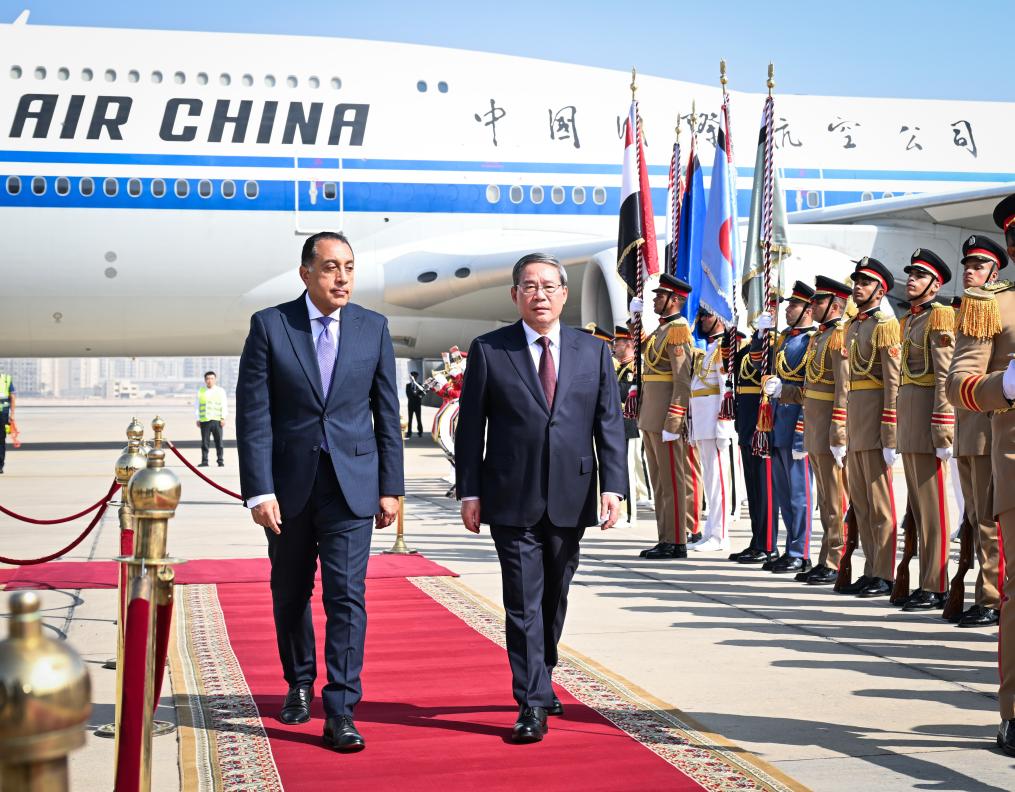Egypt hosts Chinese Premier Li Qiang to bolster economic ties

Chinese Premier Li Qiang arrived in Egypt for an official diplomatic visit aimed at enhancing economic cooperation “strategic coordination” between Egypt and Beijing on July 9th, according to The National.
The organisation of the two-day trip illuminates Egypt’s growing role in the BRICS economic alliance, compelled by its pivot towards heightened multilateralism amid Cairo’s disillusionment with the US and Israel.
Egyptian Prime Minister Mostafa Madbouly and various other senior government officials welcomed Premier Li at Cairo International Airport. The visit was inaugurated by a formal ceremony which included the national anthems of both countries and a review of the Egyptian honour guard. This marked the beginning of a visit which aims to deepen bilateral collaboration across trade, investment, and infrastructure.
Upon his arrival, Premier Li stated that “China and Egypt, as important members of the Global South, should further strengthen strategic co-ordination to safeguard their common interests.”
Cairo has been driven to recalibrate its foreign policy and main international partners due to growing frustration with Israeli crimes in Gaza and US complicity. Analysts say that Egypt is seeking to reduce reliance on Washington and pivot to China and BRICS.
This move has been partially induced by US President Donald Trump’s firm support for Israel and his demands to illegally resettle Palestinians from Gaza into the Egyptian Sinai Peninsula.
Cairo has rejected the plan as it views its implementation as simultaneously a threat to its national security and a major blow to the Palestinian struggle for self-determination.
Recent Chinese investments and military cooperation with Egypt, including the procurement of advanced HQ-9B air defence systems and joint air drills, illustrate Cairo’s foreign policy shift away from the US. Despite this, Egyptian officials insist that the US remains a key international partner.
The visit of Premier Li comes as China-Egypt relations are blossoming. According to a cabinet statement on July 9th, officials from both nations are expected to reach agreements over the expansion of Chinese investments in Egypt’s Suez Canal Economic Zone (SCZone).
The SCZone’s China-Egypt Teda Economic and Trade Co-operation Zone houses 185 enterprises, culminating in a total investment of $3 billion thus far.
China’s Belt and Road Initiative has played an integral role in developing advanced infrastructure in Egypt, including Africa’s tallest skyscraper and the country’s first electrified rail system.
Premier Li recently participated in the 17th BRICS Summit hosted by Brazil, within which Egypt’s engagement with the bloc continued to grow following its formal integration in January 2024.
Cairo’s BRICS membership has granted it access to participation in initiatives that address global trade and food security, matters which Egypt have also sought to tackle independently. Two senior Egyptian officials – Mahmoud Momtaz, chairman of the Egyptian Competition Authority, and Aly Abdelkawy from the Ministry of Supply and Internal Trade – attended a UN session on the global grain trade which was led by BRICS countries.
The session addressed the issue of systemic risks in the global food supply chain, a matter of great importance to Egypt due to its reliance on grain imports and acute vulnerability to price volatility.
Egypt’s military modernisation, which has been in part facilitated by Chinese support, has largely informed its recent foreign policy shift. The recent joint Eagles of Civilisation 2025 military drills and acquisition of Chinese military hardware made evident to Egyptian officials that any political vacuum left by a weakened US role could be filled by China.
Egypt’s worsening relationship with Israel due to its military presence in Gaza’s Philadelphi corridor – which is enabled by US support – has left Cairo with limited options to secure its interests, which analysts claim has driven the pivot to China.
Technological and cultural ties have also been furthered between the two nations. Chinese companies such as Huawei have trained tens of thousands of Egyptians in information technology, and Chinese language courses have been introduced in Egyptian educational institutions.
300,000 Chinese tourists visited Egypt in 2024, marking a vast influx. To cater to this new demand, Egypt has installed Chinese language signs at major attractions and increased the amount of Chinese speaking tour guides.
Mutual tourist exchanges are expected to increase further after Air China established a new direct flight between Beijing and Cairo on July 9th.
The National, Maghrebi.org
Want to chase the pulse of North Africa?
Subscribe to receive our FREE weekly PDF magazine












